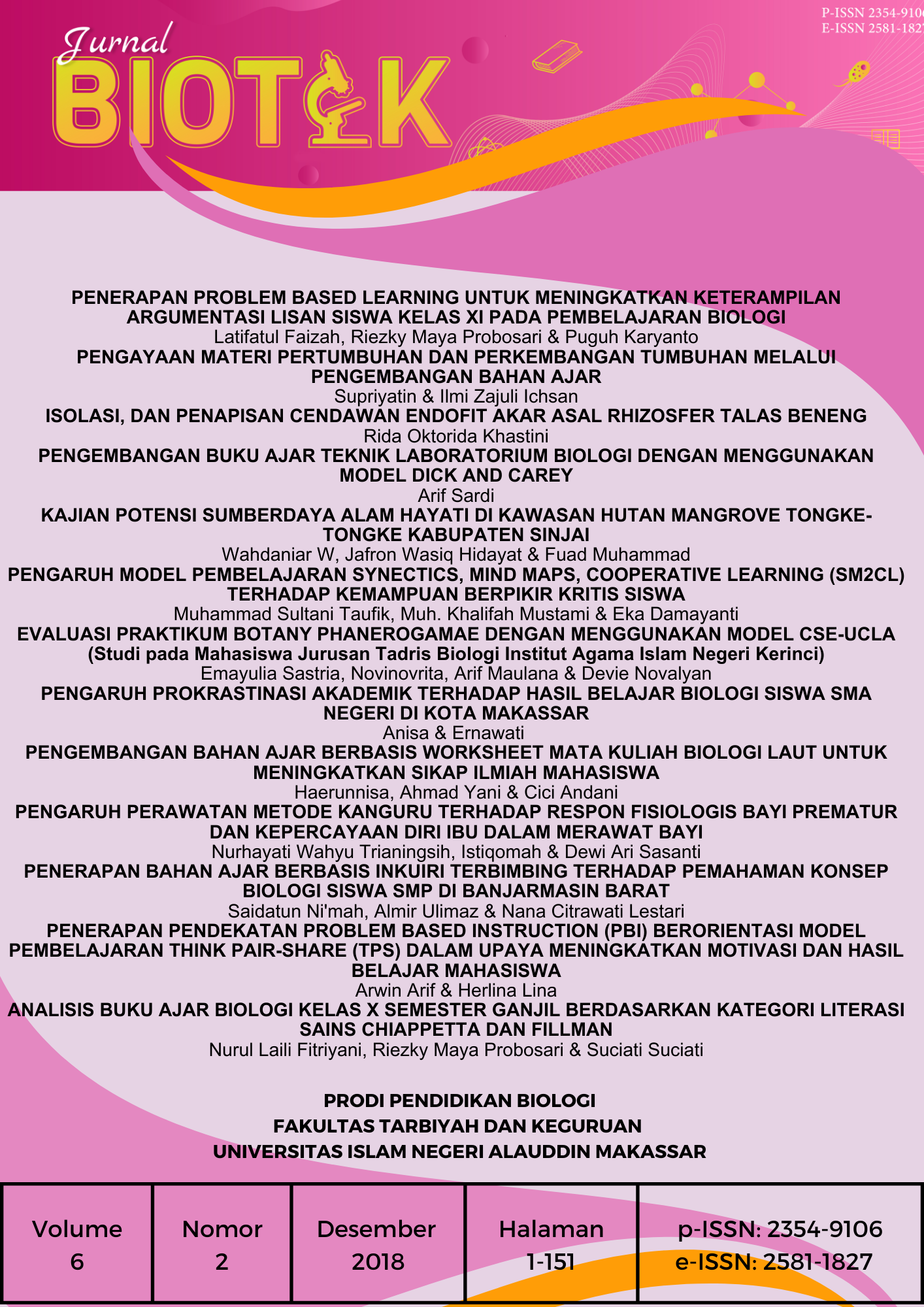PENERAPAN PENDEKATAN PROBLEM BASED INSTRUCTION (PBI) BERORIENTASI MODEL PEMBELAJARAN THINK PAIR-SHARE (TPS) DALAM UPAYA MENINGKATKAN MOTIVASI DAN HASIL BELAJAR MAHASISWA
Abstract
Penelitian ini pada dasarnya bertujuan untuk meningkatkan motivasi dan hasil belajar mahasiswa menggunakan penerapan pendekatan Problem Based Instruction (PBI) berorientasi model pembelajaran Think Pair-Share (TPS) pada mata kuliah evolusi. Jenis penelitian ini adalah penelitian tindakan kelas (classroom action). Subyek penelitian ini yaitu mahasiswa program studi pendidikan biologi yang sedang menempuh mata kuliah evolusi. Prosedur penelitian dilaksanakan melalui proses bersiklus yang terdiri atas 4 tahap yaitu perencanaan, pelaksanaan, observasi dan refleksi. Teknik pengumpulan data dalam penelitian ini dilakukan dengan teknik observasi, tes, angket dan dokumentasi. Data yang terkumpul akan di analisis menggunakan teknik persentase, statistik deksriptif dan analisis kualitatif. Dari hasil penelitian ini diperoleh data bahwa untuk motivasi belajar mahasiswa memperoleh rata-rata pada Siklus I sebesar 67,49 dan Siklus II sebesar 80,41 dengan ini menunjukkan peningkatan sebesar 12,92. Untuk hasil belajar mahasiswa memperoleh nilai rata-rata pada Siklus I sebesar 53,69 dan Siklus II sebesar 76,13 menunjukkan peningkatan yang sebesar 22,44. Berdasarkan data tersebut dapat disimpulkan bahwa Penerapan Pendekatan Problem Based Instruction (PBI) berorientasi model pembelajaran Think Pair-Share (TPS) dapat meningkatkan motivasi dan hasil belajar mahasiswa pada mata kuliah evolusi di STKIP Pembangunan Indonesia Makassar.
Kata Kunci : Problem Based Instruction (PBI), Think Pair Share (TPS), Motivasi, Hasil Belajar.
Downloads
Copyright (c) 2018 Herlina Lina

This work is licensed under a Creative Commons Attribution-ShareAlike 4.0 International License.
Authors who publish with Jurnal Biotek agree to the following terms: Authors retain the copyright and grant Universitas Islam Negeri Alauddin Makassar right of first publication with the work simultaneously licensed under a Creative Commons Attribution License (CC BY-SA 4.0) that allows others to share (copy and redistribute the material in any medium or format) and adapt (remix, transform, and build upon the material) the work for any purpose, even commercially with an acknowledgement of the work's authorship and initial publication in Universitas Islam Negeri Alauddin Makassar. Authors are able to enter into separate, additional contractual arrangements for the non-exclusive distribution of the journal's published version of the work (e.g., post it to an institutional repository or publish it in a book), with an acknowledgement of its initial publication in Universitas Islam Negeri Alauddin Makassar. Authors are permitted and encouraged to post their work online (e.g., in institutional repositories or on their website) prior to and during the submission process, as it can lead to productive exchanges, as well as earlier and greater citation of published work (See The Effect of Open Access).

This work is licensed under a Creative Commons Attribution-ShareAlike 4.0 International License.



